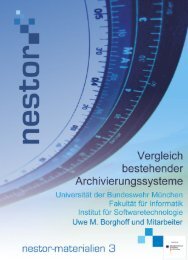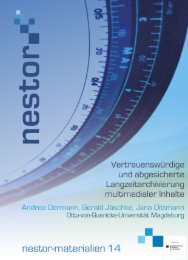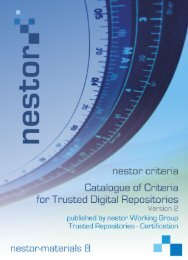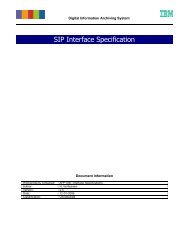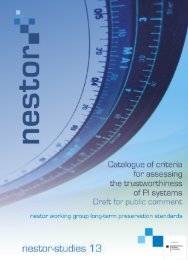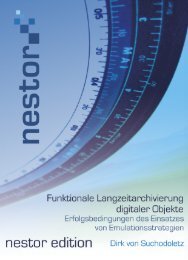Download (PDF, 9MB, Not barrier-free file.) - Nestor
Download (PDF, 9MB, Not barrier-free file.) - Nestor
Download (PDF, 9MB, Not barrier-free file.) - Nestor
- No tags were found...
Create successful ePaper yourself
Turn your PDF publications into a flip-book with our unique Google optimized e-Paper software.
While the preferred <strong>file</strong> format is <strong>PDF</strong> 154 , other formats – open and proprietary – areaccepted as well so that <strong>file</strong> format is currently not a selection criterion. In contrast topedocs, dynamic content/elements is/are not excluded.The designated community of Qucosa is at this point defined only very broadly andmoreover implicitly. Thus, it is stated in “Über Qucosa” that the repository is a servicefocusing on scholarly documents and documents from the business sector (“Dokument[e]aus Wissenschaft und Wirtschaft”). As the list of accepted document types shows, otherpublications included are musical scores 155 , which will be of interest to a very specificdesignated community that, however, will probably be very different from the designatedcommunity of publications from the business sector, for example. Finally, publicadministration institutions are also included in the list of institutions registered forsubmitting material to Qucosa, and their publications will be of interest to a veryheterogeneous group of users.For the purpose of monitoring the repository's designated community or communities,this implicit definition deriving from the published document types is far too imprecise. Onthe other hand, however, the question is whether it is feasible and possible to define thedesignated communities for a service like Qucosa, which is intended to collect andpreserve material from and for the entire federal state of Saxony, in a detailed fashion.Significant properties are not currently identified or defined for Qucosa publications.Although the significant properties are something that will have to be specified when thecooperation with a service provider for long-term preservation is brought under way, howthis is to be achieved is according to Dr. Kluge still unclear. Thus, in his opinion theconcept of significant properties seems to theoretic and abstract, in particular as it isentirely unclear to us today which properties will be regarded as significant by future usersand depositors (see also Knight 2008, 4). Thus it is worth considering, according to Kluge,a flexible and ad-hoc specification of significant properties together with the designatedcommunity whenever it becomes clear that a format is in danger of becoming obsoleteand if migration tests show that that information will be lost.Administration: Audit SubmissionA document is only published after intellectual control by a member of the repositorystaff. This quality control currently primarily concerns the associated descriptive metadata.In the future, with the implementation of koLibRI, quality control will also extend totechnical aspects such as <strong>file</strong> format validity, etc.154 In the <strong>file</strong> upload dialog, the required format of what in DSpace would be called the primary bitstream isgiven as <strong>PDF</strong>. However, the Qucosa software currently does not reject <strong>file</strong>s in other formats. As Qucosaalso accepts content such as audio, film, etc. it seems problematic to limit the preferred bitstream to <strong>PDF</strong> –this is a decision which should be reconsidered.155 In fact, the German Composers Association (Deutscher Komponistenverband) recommends thepublication of musical scores via Qucosa. See http://www.komponistenverband.de/content/view/471/117/ –18.10.2009.67



